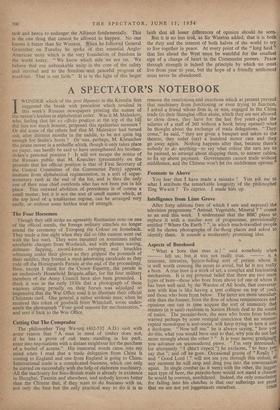A SPECTATOR'S NOTEBOOK
IWONDER which of the gros legumes in the Kremlin first suggested the break with precedent which resulted in this week's Russian newspapers printing the names of the nation's leaders in alphabetical order. Was it M. Malenkov, who, feeling that his ex officio position at the top of the bill did him too much honour, proposed this egalitarian measure ? Or did some of the others feel that M. Malenkov had turned out, after thirteen months in the saddle, to be not quite big enough for Stalin's boots ? Or was, perhaps, M. Khruschev the prime mover in a reshuffle which, though it only takes place on paper, can hardly be said to have strengthened his brother- in-law's personal position ? It will not escape the notice of the Russian public that M. Kruschev (presumably on the grounds that his official position is that of First Secretary of the Central Committee of the Communist Party) appears, immune from alphabetical regimentation, in a sort of super- numerary rank at the end of the list, and is thus the only one of their nine chief overlords who has not been put in his place. This outward abolition of precedence is of course a small matter; but it is not the sort of small matter which, at the top level of a totalitarian regime, can be arranged very easily, or without some hidden trial of strength.


































 Previous page
Previous page